Bendicht Brechtbühl
Bendicht Brechtbühl grew up Reformed, but later he and his wife joined Anabaptism. Soon their property was confiscated. After several prison sentences, he is deported by ship on the Aare and Rhine in 1710, chained to iron, and exiled to America.
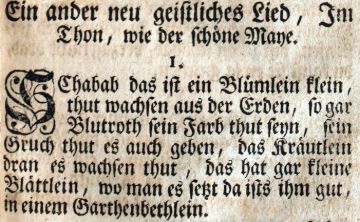
Beginning of the song "Schabab", Ein Geistliches Lieder=Büchlein, printed in this year.
The Dutch authorities do not tolerate such deportations, and so Brechtbühl is released on the way. Soon he is assisting as a mediator the Dutch Anabaptists who want to help the persecuted Swiss Anabaptists. His high acceptance, his talent for languages - he learns Dutch in a short time - and his diplomatic skills are worth their weight in gold! In search of places of asylum for the refugees from Bern, he leads a fact-finding tour as far as the Baltic States in 1711.
The misery of war in Europe finally caused him to emigrate as well: Brechtbühl spent the last years of his life in Pennsylvania. When he died in 1720, he left behind many letters and translations as well as an impressive song that was written in a Bernese prison: Schabab.
More information:
Bendicht "Bäntz" Brechtbühl von Ranflüh (1666-1720) - Anabaptist elder, songwriter, crosser of boundaries
Bendicht Brechtbühl spent his youth and childhood in the immediate vicinity of Trachselwald Castle. Partly in Chrummholz in Heimisbach, partly in the lower village of Ranflüh.
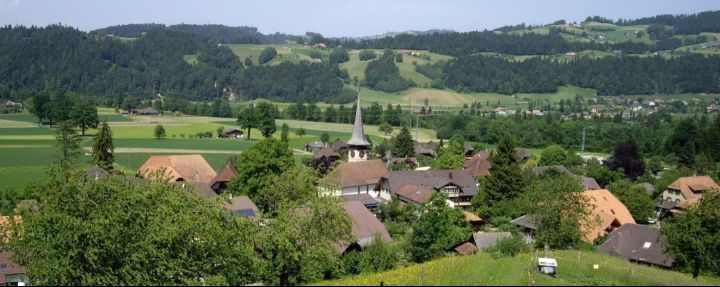
In the foreground the village of Rüederswil with the church where Bendicht Brechtbühl was baptized. In the background on the right, beyond the Emme River, the lower village of Ranflüh, where he lived for many years.
It was a troubled time. A time of destroyed hopes. Also in the Emmental, especially in the Emmental. The memories of the Peasants' War of 1653 were still fresh. The struggle of the rural population for more freedoms had been bloodily put down by the Bernese authorities.
But it was also a time of upheaval and new beginnings. The longing of many people for renewal in church and society created space in new movements such as Pietism. In the Emmental, the Reformed pastor Georg Thormann in Lützelflüh and his vicar Samuel Schumacher formed a center of this new departure.
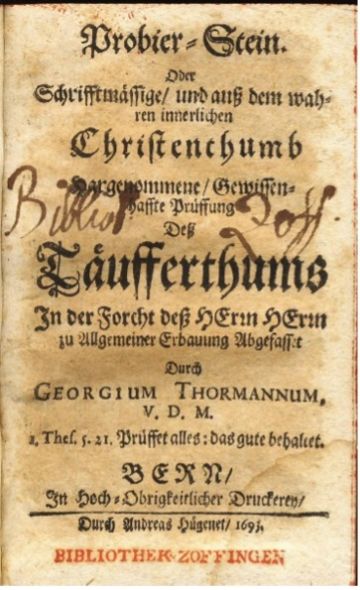
Pastor Georg Thormann of Lützelflüh suffered from the fact that many people who wanted to "be Christians in earnest" believed that they could only do so with the Anabaptists. In his book "Probierstein des Täufertums" (1693), he tried to prevent even more believers willing to renew their faith from running away from the Reformed and - like Brechtbühl - converting to Anabaptism.
The parlor meetings were numerous at that time, where people met around Trachselwald Castle to pray, sing psalms, and read the Bible in order to "be Christians in earnest". Brechtbühl, however, belonged to those Reformed church members who, in their search for a sustainable orientation in life, found a new home not in Pietism but - perhaps mediated by his wife Barbara Meister from Sumiswald - in Anabaptism.
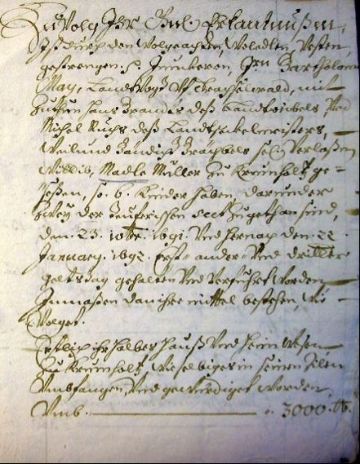
The Geltstag after the death of Bendicht Brechtbühl's father, the Bernese authorities confiscated the shares of the two Anabaptist children Barbara and Bendicht in 1692. Bendicht, as the youngest son, lost his claim to the parental farm.
Soon the Bernese authorities became suspicious of Bendicht Brechtbühl. Again and again he had to go into hiding or flee. Again and again, however, he was imprisoned and fined. Because he stubbornly insisted on his convictions, he was expelled. Picked up again after an unauthorized return, he spent almost two years in strict imprisonment, finally to be deported in March 1710, forged on iron, on a ship down the Rhine via the Netherlands to America.
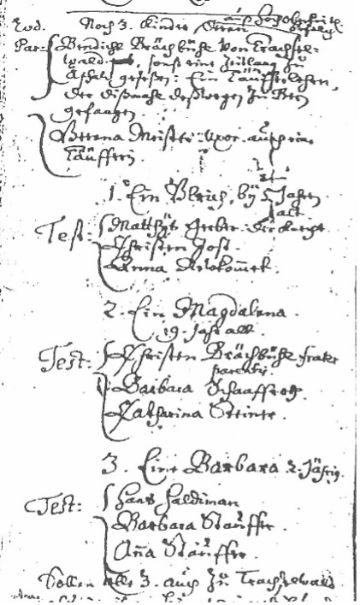
1709, three children of the Anabaptist parents Bendicht Brechtbühl and Verena Meister were baptized by force in Eggiwil: Magdalena (9), Ulrich (5) and Barbara (2).
Since the Dutch authorities did not tolerate such deportations and released all prisoners when they crossed the border, Brechtbühl was invited by Dutch Mennonites to report in Amsterdam on the conditions in his homeland. Here is the report on his own arrest in the original wording as he delivered it there:
"It happened in 1709, on January 12, that early in the morning the government of Bern sent seven gendarmes with an official to my house. This frightened us, so I tried to hide with my wife. I hid under a pile of hay. They searched the house thoroughly and finally got to the hay and stabbed it with daggers so that they touched me and felt that someone was underneath. Then when I came out, they grabbed me and asked me my name and if I was a preacher, which I answered in the affirmative. Then they took me into the living room. There one of the officers hit me on the jaw and tied my hands behind my back. When they led me out of the house, my children cried and screamed so pitifully that, as they say, a heart of stone would pity them. The Anabaptist man-hunters, however, were very happy to have captured me. So they transported me from there with two other brothers to the city of Bern and took us to prison. There we were locked up through the very long and cold winter. If we wanted some warmth, we had to pay a lot for the wood. After about six or seven days they moved me to another prison; there they put me in chains. In the meantime, the government had given 100 thalers to those who had captured me, which my family had to pay back from their own property. After two days they took me back to the tower, put me in a special hole and imprisoned me there with an iron chain. I was held there for eighteen weeks. From there they transported me to the hospital with all the other prisoners. There we had to work on the wool from 4 o'clock in the morning until 8 o'clock in the evening, and they provided us with bread and water, although we had no shortage of it. That lasted a total of thirty-five weeks. During the remaining ten weeks the work was lighter, so the total time of my confinement in Bern was one year, seven months and seven days. This occurred in my 44th and 45th years."
In the efforts of the Dutch baptized to help their persecuted fellow believers in Switzerland, Brechtbühl quickly became the central contact person. His universally high acceptance, his talent for languages - he learned Dutch within a short time - and his diplomatic skills were quickly recognized and were worth their weight in gold!
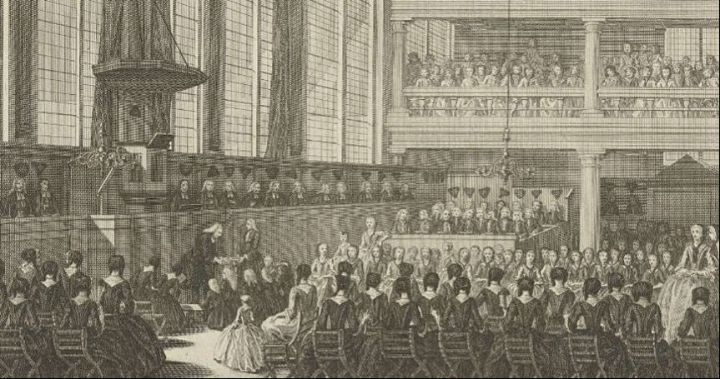
Doopsgezinde Church Amsterdam, where Brechtbühl reported on the repression of Bernese Anabaptism in 1710.
When the repression of Bernese Anabaptism became stronger and stronger and in 1711 about 500 local men and women left their homeland thanks to the support of Dutch Mennonites, Brechtbühl, who by now lived in the Kraichgau region near Heidelberg, played a central role as a middleman. In search of suitable places of asylum for the refugees, he led an extensive fact-finding tour as far as East Prussia and the Baltic States in the summer of 1711.
Shortly thereafter, Brechtbühl was among the growing number of those who, in the endless succession of wartime misery and famine in Alsace, the Palatinate, and Kraichgau, found a way out only in emigration to North America. Brechtbühl spent the last years of his life in Pennsylvania - the El Dorado of many religious nonconformists who had fled Europe. When he died in 1720, he left behind a large number of letters and translations of edifying texts written in Dutch, as well as an impressive song he had written in a Bernese prison.
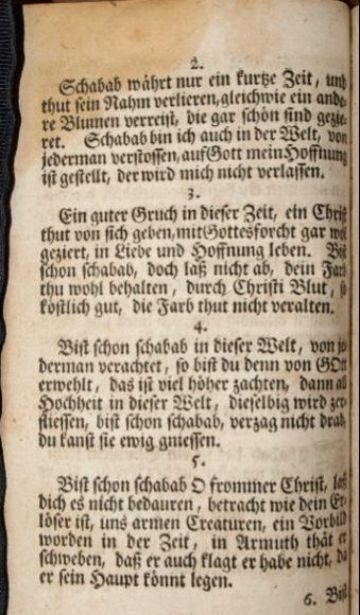
Verses 2 to 5 from Bendicht Brechtbühl's Shabab Song from 1709.
For details and the exact source evidence, see Hanspeter Jecker: Bendicht Brechtbühl (1666-1720). Täuferlehrer, Brückenbauer und Grenzüberschreiter aus dem Emmental, in: Mennonitica Helvetica 36 (2013), 105-158.



